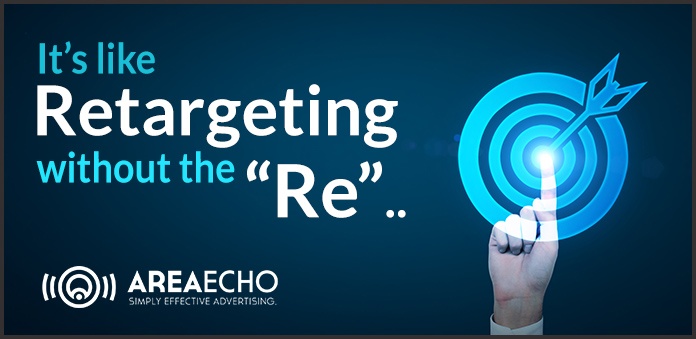It’s like retargeting, just without the “re”..

This question keeps coming up when people call in, so I figured I would write a blog post about it.
The question usually goes something like:
“Hey I checked out the website and watched one of the videos, this looks like a great product, but how does it work exactly?”
Lets start with Retargeting
Let’s start with the technology that we patterned this after, which is retargeting. The process usually happens like this:
- A visitor visits a website and looks at something
- The website “pixels” them, allowing them to target them later
- The visitor leaves, and goes on surfing the rest of the web
- The website places personalized ads in front of the visitor on other websites
That’s a very simple explanation of it, but it’s pretty much retargeting in a nutshell. Retargeting is super powerful and very VERY cost effective when it is done correctly. Over at MosierData we’ve set it up for a lot of clients in a lot of industries.
Retargeting’s Only Weakness
The only problem with retargeting for most small businesses are items #1 and #2 above. A lot of folks just aren’t getting the traffic to needed to run an effective retargeting campaign. Especially in the home services niches that we have decided to dedicate this product to.
So what do you do to account for that lack of traffic?
Well, for us, we decided to quit bashing Google and Facebook for their “Big Data” collection practices, and actually use their efforts to help out the little guy.
The “In-Market” Segment
Let’s think about this in the offline world for a second. Lets say, for instance, its 20 years ago and you pick up the morning paper in your office break room and start studying the automobile ads. On your way to and from work the next few days you stopped by different car dealers, maybe even took a few test drives. If one of your coworkers was paying attention, it would be safe for them to assume you were looking to buy a car, right?
Now back to AreaEcho and online in-market segments. This same principle applies except in this case Google has replaced your newspaper and websites are your equivalent to the car dealers. I will give you a more specific example. Let’s take someone who’s thinking about buying a house. Here is a likely profile of some of their online activity:
- Googles a term like “First time homebuyer programs”
- Visits Zillow.com, Trulia.com or Realtor.com (or all three)
- Googles something like “Mortgage Payment on $150,000 loan”
- Visits BankRate.com, LendingTree.com, QuickenLoans.com
As you can see, just their online activity alone can tell you a lot about their intentions. This activity above would actually place them into 2 different in-market segments: One for “Real Estate For Sale (Residential)” and one for “Mortgage: Home Purchase Loans”.
Let’s address the “creepiness” issue
Since you are, in essence profiling someone based on their activity (I prefer the term “digital footprint”) you might think there are some privacy and ethical issues here. Well there’s not, and I will explain why.
First is the fact that we don’t know who we are targeting. We don’t know anything about them except that they demonstrated the pattern we described above and their computer’s IP address is located in the geographical area we are targeting.
Second comes the fact that we’re not even really collecting this Data. It’s companies like Facebook and Google that do that. All we do is tap into it, for the purpose of putting an ad in front of people.
Tying it all together
So to summarize, as you can see, AreaEcho works a lot like retargeting. The main difference is that instead of identifying people to target based on a pixel from your website, we target them based on their online behavior and their location.
Using this method is a powerful way to get your brand out there, and, if you get creative with a good offer and a landing page, could generate traffic to your website.
I hope this is a better explanation for you. I also hope you consider signing up today and giving it a try for your business. 🙂
